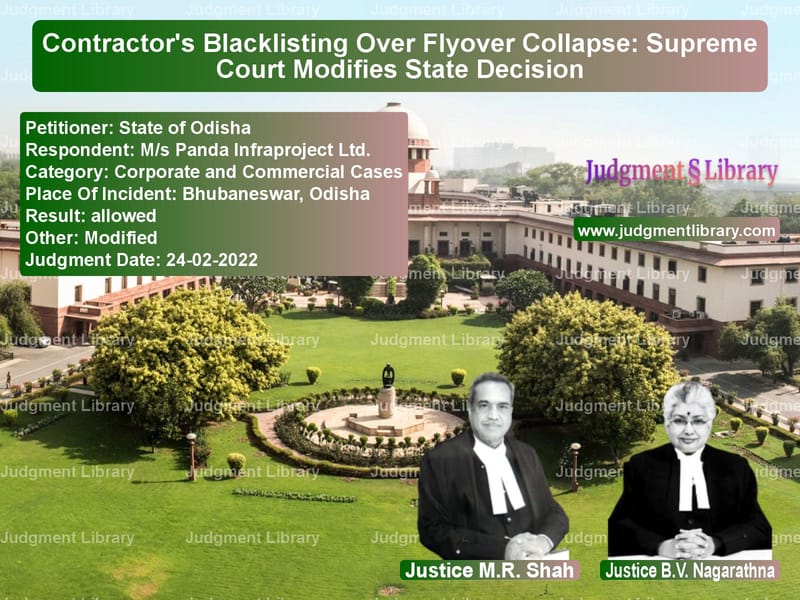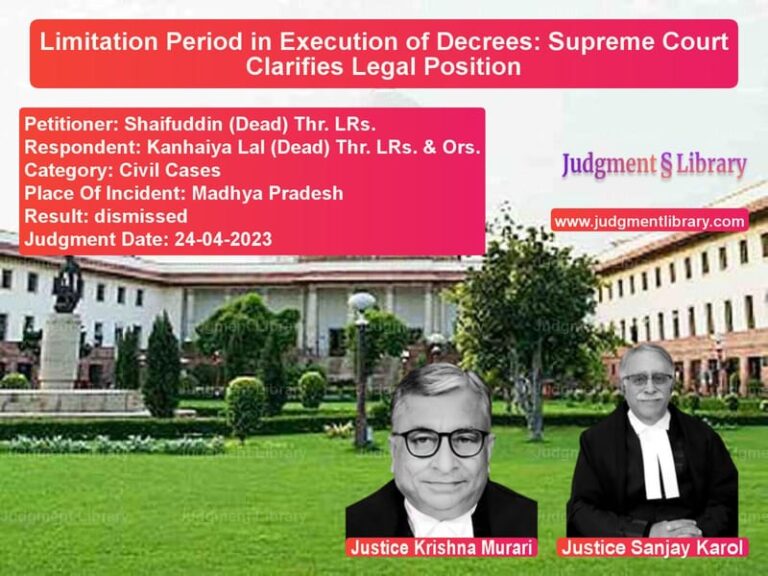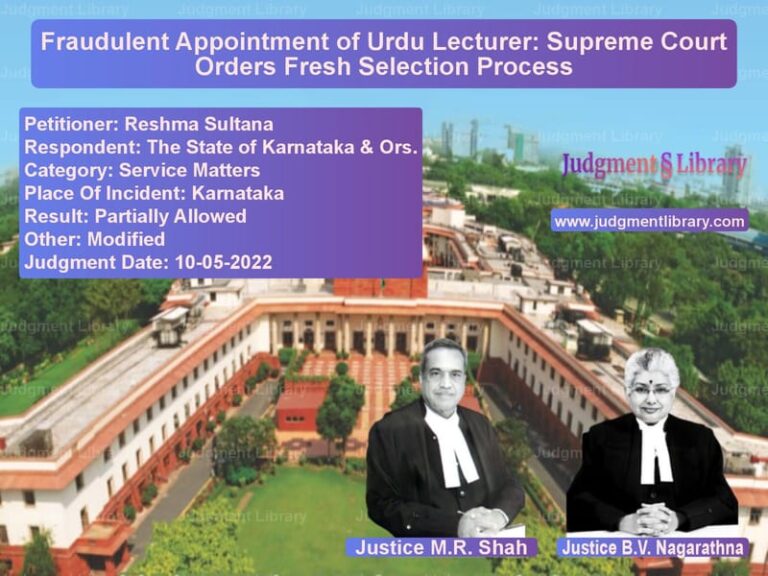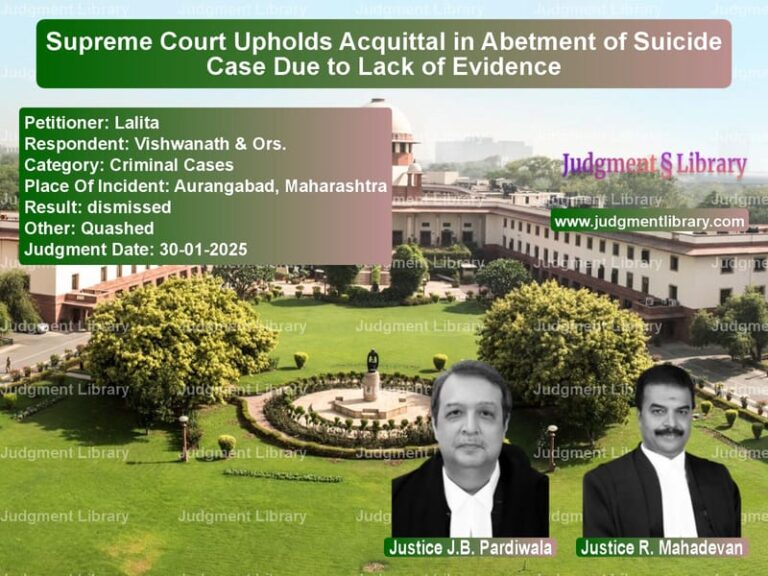Contractor’s Blacklisting Over Flyover Collapse: Supreme Court Modifies State Decision
The case of State of Odisha vs. M/s Panda Infraproject Ltd. revolves around the serious issue of a contractor’s blacklisting following a tragic incident involving a flyover construction in Bhubaneswar, Odisha. The Supreme Court dealt with the legality of the blacklisting of the contractor after a fatal accident occurred due to the contractor’s alleged negligence in the construction process. The judgment clarifies the standards for blacklisting contractors and emphasizes the principles of natural justice and fair procedure.
Background of the Case
The respondent, M/s Panda Infraproject Ltd., was contracted by the State of Odisha for the construction of a flyover at Bomikhal Junction in Bhubaneswar. During the construction, a ten-meter slab collapsed while concreting the railway overbridge at the level crossing. This accident resulted in the death of one person and injuries to eleven others. An inquiry was conducted, and the contractor was found responsible for the accident due to various lapses in safety and quality assurance.
The inquiry report revealed that:
- The contractor had failed to submit the proper formwork design and had used their own arrangement, which led to the collapse.
- The necessary safety measures were not followed during the construction, which could have prevented the fatal accident.
- The quality assurance protocols were not adhered to, as required by the contract and safety codes.
- Deficiencies in the contractor’s workmanship affected the safety and stability of the structure.
Following the inquiry, the State Government decided to blacklist the contractor, banning them from participating in any future government projects. This decision was based on the contractor’s negligence and failure to maintain safety standards during construction.
Procedural History and Challenge
Aggrieved by the blacklisting order, the contractor filed a writ petition before the High Court of Orissa, challenging the blacklisting on the grounds of violation of principles of natural justice. The High Court ruled in favor of the contractor, quashing the blacklisting order and stating that the decision to blacklist the contractor was pre-determined and made without sufficient opportunity for the contractor to defend itself.
The High Court’s ruling was based on the assertion that:
- The blacklisting order was pre-determined, as evidenced by prior communications from the State Government to the Chief Engineer.
- The contractor was not provided with an adequate opportunity to present a proper defense.
- The blacklisting violated the principles of natural justice, as the contractor was not given a fair chance to be heard.
In response to this ruling, the State of Odisha filed two civil appeals in the Supreme Court. The first appeal challenged the quashing of the blacklisting order, and the second appeal was filed to contest the High Court’s directive to remove the contractor’s name from the blacklisted list.
Arguments of the State of Odisha
The appellant, the State of Odisha, represented by Shri Ashok Kumar Parija, Advocate General, argued that:
- The High Court erred in quashing the blacklisting order on the grounds of pre-determined action.
- The inquiry report clearly identified the contractor’s negligence, and the decision to blacklist was based on a thorough investigation.
- The State followed the procedural requirements under the Orissa Public Works Department (OPWD) Code, issuing a show-cause notice and giving the contractor an opportunity to reply before passing the blacklisting order.
- The gravity of the accident and the contractor’s repeated lapses in ensuring safety during construction made blacklisting a necessary step to protect public interest.
Arguments of the Contractor (Respondent)
The respondent, M/s Panda Infraproject Ltd., represented by Shri Sibo Sankar Misra, Advocate, countered with the following points:
- The blacklisting order was pre-decided and not based on a fair evaluation of the facts.
- The show-cause notice was issued after the decision had already been made, thus rendering the process a mere formality.
- The contractor had completed the balance work and made corrective adjustments to the construction under the revised design, which satisfied the State’s requirements.
- The blacklisting was disproportionately harsh, especially since this was the contractor’s first offense, and it involved an isolated incident.
- Even after the blacklisting order, the State of Odisha’s office memorandum (dated 26.11.2021) allowed for a limited blacklisting period, which should apply in this case.
Supreme Court’s Observations
The Supreme Court critically examined the actions of both the State and the contractor, focusing on the procedural fairness and legal implications of the blacklisting process. The Court observed:
“Merely because an inquiry report leads to a conclusion, it cannot be said that the decision to blacklist was pre-determined. A contractor must be given a reasonable opportunity to respond to the charges before such an action is taken.”
The Court also highlighted that:
- The show-cause notice was a crucial step, ensuring transparency and allowing the contractor to present their defense.
- While a contractor’s negligence and safety lapses were serious, the decision to blacklist permanently must be proportionate to the offense.
- Although the blacklisting procedure was initiated correctly, the final decision regarding its duration required a more nuanced approach, taking into account the specific circumstances of the case.
Final Judgment
The Supreme Court allowed the appeal of the State of Odisha in part. The Court ruled that:
- The blacklisting order passed by the State of Odisha was justified and not pre-determined.
- The High Court’s judgment quashing the order of blacklisting was set aside.
- However, the Court found the period of blacklisting to be disproportionately harsh, and therefore, the blacklisting period was reduced to five years, starting from the date of the original blacklisting order.
- The second appeal (challenging the removal of the contractor’s name from the blacklisted list) was dismissed.
Implications of the Judgment
This ruling has several key implications:
- It reinforces the principle that blacklisting a contractor is a serious decision and should be based on a thorough evaluation of the facts, including the gravity of the offense and the contractor’s past record.
- It limits the scope of permanent blacklisting, emphasizing that the duration of debarment should be based on the severity of the misconduct.
- It sets a precedent that procedural fairness in administrative decisions, such as blacklisting, must be upheld in order to ensure transparency and justice.
- The case highlights the importance of appropriate penalties for contractors, balancing the need to protect public safety with the principles of fairness.
Conclusion
The Supreme Court’s decision in State of Odisha vs. M/s Panda Infraproject Ltd. sets an important precedent in the field of public works contracting. It underscores the importance of fair procedures in imposing penalties such as blacklisting and ensures that the duration of such penalties is proportionate to the severity of the breach. This case will serve as a reference point for future decisions involving debarment and the balance between ensuring safety in public infrastructure projects and protecting contractors’ rights.
Petitioner Name: State of Odisha.Respondent Name: M/s Panda Infraproject Ltd..Judgment By: Justice M.R. Shah, Justice B.V. Nagarathna.Place Of Incident: Bhubaneswar, Odisha.Judgment Date: 24-02-2022.
Don’t miss out on the full details! Download the complete judgment in PDF format below and gain valuable insights instantly!
Download Judgment: state-of-odisha-vs-ms-panda-infraproje-supreme-court-of-india-judgment-dated-24-02-2022.pdf
Directly Download Judgment: Directly download this Judgment
See all petitions in Company Law
See all petitions in Corporate Compliance
See all petitions in unfair trade practices
See all petitions in Judgment by Mukeshkumar Rasikbhai Shah
See all petitions in Judgment by B.V. Nagarathna
See all petitions in allowed
See all petitions in Modified
See all petitions in supreme court of India judgments February 2022
See all petitions in 2022 judgments
See all posts in Corporate and Commercial Cases Category
See all allowed petitions in Corporate and Commercial Cases Category
See all Dismissed petitions in Corporate and Commercial Cases Category
See all partially allowed petitions in Corporate and Commercial Cases Category







